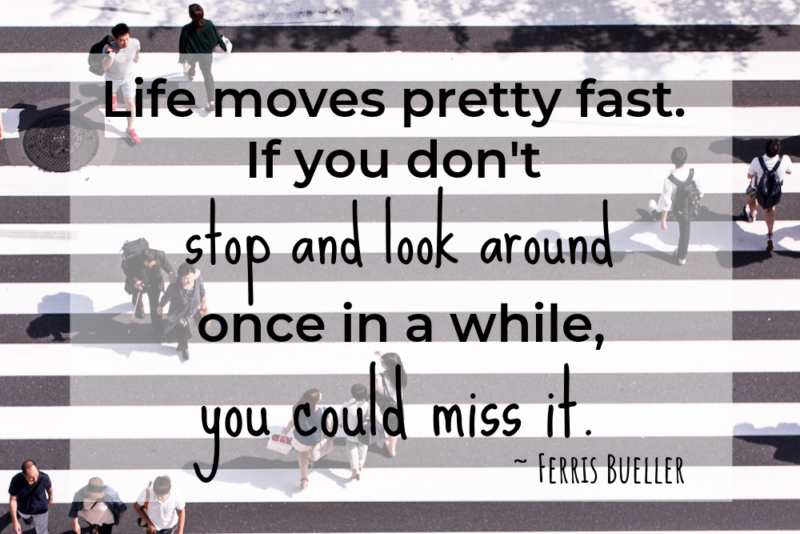
Note: This is the second in a five-part series on mindfulness and mindful eating.
Who knew a 1980s teen classic movie could offer such an insightful comment about the merits of mindfulness? Are any of the statements below true for you?
- I sometimes feel like my life is moving too fast, and that it’s challenging to notice — let alone appreciate — its little (or even big) moments?
- I find it hard to “manage” my mind as it races from one thought to another?
- My mind often gets stuck replaying the past or trying to forecast the future. (Note, it’s possible that your mind is doing this but you’re not noticing it, as is the case with many people.)
- I frequently act — or speak — without thinking: flipping off rude drivers or cutting down coworkers, friend or loved ones with words that I wish I could take back.
If you see yourself in any of these statements, cultivating mindfulness can help.
Mindfulness definition — and why is it helpful?
As I mentioned in the previous post, Jon Kabat-Zinn — who created the Mindfulness-Based Stress Reduction (MBSR) program and founded the Center for Mindfulness in Medicine, Healthcare and Society at University of Massachusetts Medical School — defines mindfulness as, “paying attention in a particular way: on purpose, in the present moment, and non-judgmentally.”
Although mindfulness is often associated with Buddhism, it’s also steeped in science, and people from all walks of life can benefit from a mindfulness practice.
When asking, “Why cultivate mindfulness?” first consider that when our default is mindlessness, it’s easy to be controlled by our thoughts and not even notice.
As you develop your “mindfulness muscle,” you’ll find that you are less likely to become overly reactive or overwhelmed by what’s going on around you, or by what’s going on in your head, because you are actually noticing your thoughts, feelings and emotions — you’re becoming mindful.
Mindfulness, acceptance and non-judgment
Some of those thoughts, feelings and emotions you’re starting to notice might be uncomfortable (“I’m feeling angry”) or even make you cringe (“Wow, some of my thoughts are really mean”). If you judge yourself for having them, you’ll want to ditch your mindfulness practice.
Acceptance is also part of non-judgment. Now, accepting our thoughts, feelings and emotions doesn’t necessarily mean that we like them or have to resign ourselves to always having them, but it means simply that we accept, right now in the present moment, that we are indeed having that thought, like it or not. When you get caught up in “I shouldn’t be having this thought/feeling this way,” then your discomfort increases.
This also applies to what’s going on in the environment around us. For example, if you are fuming about standing in a long line, and thinking that it’s unfair that you’re standing in line, you are going to have a very different experience than if you accept that you are standing in line, which is no one’s favorite thing (so what you’re experiencing is part of the human condition), and that’s simply the way that it is at this moment in time.
[Note, I’ve had people ask me, “What about if someone is harassing me,” or “What if I witness someone being harmed.” You would accept that it’s happening, because it IS happening (as opposed to telling yourself “This can’t be happening”), but you can still choose to take appropriate action. Acceptance doesn’t mean melting into a blob of complacency.]

Responding, not reacting
The bottom line is that when you become aware of your thoughts non-judgmentally, you can decide if they are helpful, and let them go if they’re not. Your newfound awareness — and ability to notice your thoughts, feelings and emotions — gives you more choice in the actions you take, allowing you to stop living on autopilot and unhook from habitual, unhelpful patterns.
You can respond to internal stimuli (those thoughts, feelings and emotions) and external stimuli (people, situations and events that tend to trigger potentially troublesome thoughts, feelings and emotions), rather than react.
I was recently listening to an interview between Dan Harris, an ABC News anchor and author of “10% Happier” and “Meditation for Fidgety Skeptics,” and meditation teacher Oren Jay Sofer, and they were talking about the importance of humor in a mindfulness practice.
Harris said, “If you’re going to look into your own mind, and do that without a sense of humor, you are in trouble.” I couldn’t agree more, because sometimes it’s like, “WHAT is happening in there?!?!”
Mindfulness meditation
There has been an explosion of research on mindfulness in the fields of psychology and neuroscience. Most of that research uses mindfulness meditation, which has been shown to reduce stress, anxiety and depression as well as improve symptoms of chronic pain and support immune system health. Research also demonstrates that mindfulness meditation produces positive changes in areas of the brain related to emotions and behavior change.
Researchers have found that there are two types of mindfulness: state and trait.
- State mindfulness is being deliberately, intentionally mindful, such as when you are meditating. You temporarily change what’s going on in your brain, and any related activity that might come out of what’s going on in your brain.
- Trait mindfulness has to do with whether you have a mindful disposition, so to speak. If you have a mindful disposition, you are likely to be more aware of your thoughts, feelings and emotions, as well as what’s going on in your environment, without necessarily trying. You’re more likely to eat mindfully. Research is finding that practicing state mindfulness, over time, increases our trait mindfulness. That’s because of what’s known as neuroplasticity, or the ability of our brains to change throughout our lives.
In my next post, I offer some mindful eating tips. In the post after that, I’ll give you some pointers, and a robust list of resources, to help you start a mindfulness meditation practice, if you are so inclined.
Note: If you find if very difficult to acknowledge or cope with unpleasant emotions—or feel overwhelmed by any heightened emotion, even “pleasant” ones—consider exploring mindfulness under the guidance of a therapist trained in Mindfulness-Based Cognitive Therapy (MBCT) or Acceptance and Commitment Therapy (ACT).
Disclaimer: All information provided here is of a general nature and is furnished only for educational purposes. This information is not to be taken as medical or other health advice pertaining to an individual’s specific health or medical condition. You agree that the use of this information is at your own risk.
Hi, I’m Carrie Dennett, MPH, RDN, a weight-inclusive registered dietitian, nutrition therapist and body image counselor. I offer compassionate, individualized care for adults of all ages, shapes, sizes and genders who want to break free from eating disorders, disordered eating or chronic dieting. If you need to learn how to manage IBS symptoms with food, or improve your nutrition and lifestyle habits to help manage a current health concern or simply support your overall health and well-being, I help people with that, too.
Need 1-on-1 help for your nutrition, eating, or body image concerns? Schedule a free 20-minute Discovery Call to talk about how I can help you and explore if we’re a good fit! I’m in-network with Regence BCBS, FirstChoice Health and Providence Health Plan, and can bill Blue Cross and/or Blue Shield insurances in many states. If I don’t take your insurance, I can help you seek reimbursement on your own. To learn more, explore my insurance and services areas page.
 Print This Post
Print This Post






